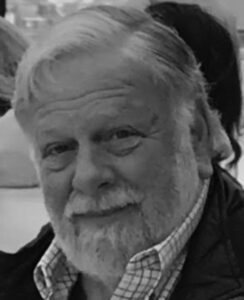Pacifica Extension and International Studies will offer “Mind of State: Politics, Psyche and Soul in Turbulent Times” on August 28, September 4, 11, 18, 25, October 2, 2024. This six-week course is based on the recent book, Mind of State: Conversations on the Psychological Conflicts Stirring U.S. Politics and Society. I’m delighted to be speaking with co-editors Betty Teng and Dr. Thomas Singer, the instructors of this course. This is Part I of II.
Angela Borda: Thank you so much for speaking with me today. We live in an age when discussing politics can easily lead to ruptures in relationships with friends, family, and colleagues. So let’s set the stage now by saying that although we are all possessed of our own political opinions and affiliations, our focus today is on psyche and politics, which we want to approach in a measured and respectful way. The course you’re teaching for Pacifica will run parallel to the presidential race. Is the course going to interact with real-time events and how will you approach this through the lens of psyche and soul?
Betty Teng: We will be addressing real-time events. We felt that was one of the benefits of offering the course in tandem with the peak of the presidential election. In particular, we want to offer a thoughtful way to approach this volatile election season in order to ground ourselves. As mental health clinicians, our job is to encourage people to stop and reflect, and I see this course as a way we can bring people together to think about the current political violence and heatedness in a more nuanced way, one that doesn’t cause splits in personal relationships, so we can all occupy a less binary middle ground.
Dr. Thomas Singer: Jung talked about the spirit of the times and the spirit of the depths. When we put together the book Mind of State, it was about the spirit of the times, which are shifting rapidly. There are some basic, unchanging themes that we’ll explore, but even as we speak the times are shifting. The psyche part will hopefully give something of the spirit of the depths, that we’ll bring a depth psychological approach to it.
Angela: Most elections are filled with a lot of harsh portrayals and emotional violence, but rarely to this degree. And a lot of us would say, perhaps jokingly, that we’re traumatized by politics. You both have private practices. Have you seen a rise in anxiety or depression or trauma in your clients due to the last few years of political happenings?
Betty: It’s always hard to generalize. But I mainly work with survivors of domestic violence and sexual violence, and I got into writing about politics through my work as a trauma therapist after experiencing the impact of Donald Trump’s presidential election upon my patients. I would say starting with the presidential election season of 2016, politics has definitely become more traumatizing, particularly for survivors of gender-based violence, but also for others. I’d say in the last 10 years politics as a topic has definitely become much more prevalent in our session rooms and in our personal and professional relationships. Our conflicts and stresses have much more to do with politics than ever before. It’s been unprecedented.
Thomas: Betty is the expert in trauma therapy, and I think she’s very close to a severely traumatized population in her practice, so I defer to her sense of increased trauma as a consequence of our political environment. In my practice, I don’t work with a highly traumatized population, but I have a sense of people being deeply stirred up by the polarizing effects of our political and cultural life. It’s not just politics. What’s striking in the election so far is there hasn’t been substantive discussion of issues; it’s really about cultural divide. Our politics are not about political policy but about cultural issues. Between our two candidates, it’s all about the cultural wars as expressed in the polarizing appearance of their different personalities and abilities. Cultural divide has become political divide.
Angela: It’s my perception that previous elections in the last half century may have had a lot of mud slinging, but never the sense that our democracy or the solvency of our government is at stake. The fifth lecture of your course is titled “Democracy at Risk,” so I assume you will be addressing that sense of danger. If we look at the country as a psyche, and our nation as a relatively young entity, and therefore still developing its sense of self, where are we in our psychological development? What can account for this sense of danger and unease? And what is the way through?
Thomas: I think that the media has so hyped this up that this election we have trouble sorting out what is a risk and what is hype. We have such difficulty because issues have been amplified in emotional intensity. There’s a worry about a move toward totalitarianism. The institutions of democracy are having a profound transition if not an active threat to undermine them.
The goal of the book and our course is to make room to think about these issues because the emotionality around them is so intense. Many of us get so impassioned that no matter which side of the divide we’re on, our own capacities to think are diminished. The book is designed to help people think about the issues. So far, I haven’t seen anything like thought that we’re being asked to consider in this election. Thought has disappeared in this political exchange. It’s been pushed aside by the emotionality.
Betty: What we can add to this question is, “Are we losing faith in democracy” due to these cultural wars and mud slinging and fear mongering? We—with the podcast, the book and now our course—consistently hope to find some signal in all this noise. To Tom’s point, is democracy really at risk? We want to look at our personal responsibility as citizens as to how we contribute to this democracy. So if we are psychologically grounded in our responsibilities, then how to consider what part do we each have to play in contributing to a healthy democracy? That’s something we have an opportunity to think about as the presidential election occurs during our course. How can we tolerate a difference of opinion, which is what democracy is all about? That’s being challenged now, the tolerance of difference.
Join us for “Mind of State: Politics, Psyche and Soul in Turbulent Times” on August 28, September 4, 11, 18, 25, October 2, 2024. Register here.

Betty P. Teng, MFA, LCSW is a psychoanalyst and trauma therapist who has worked with survivors of sexual assault, domestic violence, and childhood molestation at Mount Sinai Beth Israel’s Victims Services Program in Manhattan. She is one of the co-authors of the New York Times bestseller The Dangerous Case of Donald Trump and a contributing essayist to Adam Phillips’s The Cure for Psychoanalysis. A new book she co-edited (with Tom Singer and Jonathan Kopp), titled Mind of State: Conversations on the Psychological Conflicts Stirring U.S. Politics and Society has been recently released by Chiron Publications. It is based on the psycho-political podcast, MIND OF STATE, which she co-founded and co-hosted. On the faculty of the Manhattan Institute of Psychoanalysis’s Trauma Studies program and its One Year Program on Psychoanalysis in the Sociopolitical World, Betty currently sees couples and adults in private practice in New York City.

Thomas Singer, M.D., is a psychiatrist and Jungian analyst in private practice in San Francisco. Dr. Singer’s newest book is entitled Mind of State: Conversations on the Psychological Conflicts Stirring U.S. Politics and Society which has been co-edited with fellow contributors to The Dangerous Case of Donald Trump. Dr. Singer is the editor of a series of books which explore cultural complexes in different parts of the world, including The Cultural Complex, Australia (Placing Psyche), Latin America (Cultural Complexes of Latin America), Europe (Europe’s Many Souls), North America ( Cultural Complexes and the Soul of America), and Southeast Asia (Cultural Complexes in China, Japan, Korea, and Taiwan) In addition he has edited Psyche and the City, The Vision Thing, co-edited the Ancient Greece, Modern Psyche series and co-authored A Fan’s Guide to Baseball Fever. Dr. Singer currently serves as the President of National ARAS which explores symbolic imagery from around the world.

Angela Borda is a writer for Pacifica Graduate Institute, as well as the editor of the Santa Barbara Literary Journal. Her work has been published in Food & Home, Peregrine, Hurricanes & Swan Songs, Delirium Corridor, Still Arts Quarterly, Danse Macabre, and is forthcoming in The Tertiary Lodger and Running Wild Anthology of Stories, Vol. 5.


